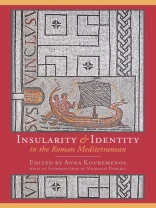Insularity – the state or condition of being an island – has played a key role in shaping the identities of populations inhabiting islands of the Mediterranean. As entities surrounded by water and usually possessing different landscapes and ecosystems from those of the mainland, islands allow for the potential to study both the land and the sea. Archaeologically, they have the potential to reveal distinct identities shaped by such forces as invasion, imperialism, colonialism, and connectivity. The theme of insularity and identity in the Roman period has not been the subject of a book length study but has been prevalent in scholarship dealing with the prehistoric periods. The papers in this book explore the concepts of insularity and identity in the Roman period by addressing some of the following questions: what does it mean to be an island? How has insularity shaped ethnic, cultural, and social identity in the Mediterranean during the Roman period? How were islands connected to the mainland and other islands? Did insularity produce isolation or did the populations of Mediterranean islands integrate easily into a common ‘Roman’ culture? How has maritime interaction shaped the economy and culture of specific islands? Can we argue for distinct ‘island identities’ during the Roman period? The twelve papers presented here each deal with specific islands or island groups, thus allowing for an integrated view of Mediterranean insularity and identity.
Kouremenos Anna Kouremenos
Insularity and identity in the Roman Mediterranean [PDF ebook]
Insularity and identity in the Roman Mediterranean [PDF ebook]
Mua cuốn sách điện tử này và nhận thêm 1 cuốn MIỄN PHÍ!
Ngôn ngữ Anh ● định dạng PDF ● Trang 208 ● ISBN 9781785705830 ● Biên tập viên Kouremenos Anna Kouremenos ● Nhà xuất bản Oxbow Books ● Được phát hành 2017 ● Có thể tải xuống 3 lần ● Tiền tệ EUR ● TÔI 6637685 ● Sao chép bảo vệ Adobe DRM
Yêu cầu trình đọc ebook có khả năng DRM












